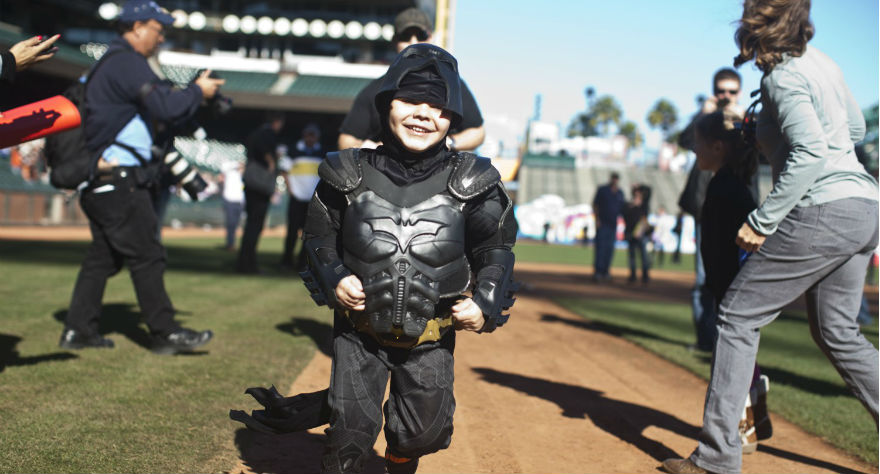
A behind-the-scenes look at one of the most unlikely human-interest stories in recent memory.

A behind-the-scenes look at one of the most unlikely human-interest stories in recent memory.
On November 15th, 2013, a then 5-year-old Miles Scott became the center of one of the biggest, most unlikely media events in recent memory. You probably already knew that, though; when Miles donned a mini Batsuit and fought crime on the streets of San Francisco alongside the caped crusader himself, the world was watching—and tweeting, and cheering, and, most importantly, smiling—as Batkid cleaned up “Gotham.” Recovering from leukemia, Miles and his parents, Nick and Natalie, humble folks from rural Tule Lake, California, asked the Greater Bay Area Make-A-Wish Foundation to help him fight super villains for a day, and Dana Nachman’s Batkid Begins recounts the tireless preparation and worldwide hysteria that ensued during the lead-up to Batkid’s big moment.
The movie’s title is a bit misleading; Miles isn’t actually the main character of Nachman’s story. A better case could be made for the film’s hero being Patricia Wilson, the Make-A-Wish Greater Bay Area executive director. The film isn’t so much about Miles or his sickness or his day as Batkid, but about Wilson’s mission to organize and rally her resources to make sure the event went off without a hitch. It was an epic undertaking that saw the entire city work together to make Miles’ dreams come true.
It started with Wilson contacting inventor/stuntman EJ Johnston to put together a little show for Miles at a park in his hometown in front of family and friends. As news of the wish started to spread throughout Wilson’s large web of contacts, however, the plans ballooned in scale: the site moved to San Francisco, performers were cast as the Bat-villains, the SF Opera House made costumes, the police shut down streets, AT&T Park got booked, and 25,000 eager onlookers piled onto sidewalks to catch a glimpse and participate in one of the biggest flash mobs ever. Nachman takes time to pay homage to the countless hours of work everyone clocked in, and it swells the heart to see people acting with such selflessness, slaving away for a boy they’ve never met. Even Barack Obama tweeted about Batkid, a heartening demonstration of the event’s mainstream appeal.
It’s unbelievably cute and entertaining to watch Miles live out his dreams. The best moments are when he’s in pursuit of a bad guy (The Riddler and Penguin both make appearances) and a look of heroic determination crawls across his face. It’s a thrill to see how excited and caught up he gets, and the film is actually incredibly suspenseful when, at one point, he tells his dad he’s tired and just wants to go home, which would derail the very expensive city-wide arrangements. The best thing about Miles is that he has absolutely no grasp on the effect he’s having on everyone. Looking down from the Macy’s building in Union Square at a sea of dancing fans chanting his name, he honestly has no clue why they’re so excited. He asks EJ (dressed up as the Big Bat) why they’re dancing, and he answers, “Believe it or not, they’re dancing for you!”
Something particularly fascinating is the lengths Miles’ parents had and have to go to shield him from all the media attention and mini-celeb status following the event. He’s a kid from a small town going to school after all and were he to guest on talk shows and do radio interviews, there’s a danger it might all go to his head. Late in the film, they share that Miles got in trouble for getting in the middle of a fight between two other kids at school. The potential warping of his self-image is an interesting topic, but Nachman steers clear of delving into it too much, for better or for worse.
Nachman’s behind-the-scenes approach works well for the most part, though some segments are so insanely syrupy you can’t help but cringe a bit (someone actually refers to Miles as a savior for the human race). The sole section that addresses Miles’ sickness plays out in motion-comic form, which is a cute touch and looks great though it doesn’t feel critical to the overall story. The rest of the footage, including the talking head interviews (surprisingly enough), is pretty great, especially when Nachman focuses on the volunteers obsessing over the smallest details (EJ has a mini-breakdown when his wrist-mounted video projector breaks down days before the event). The first of many tears shed by yours truly came during an interview with the boy who owned the homemade Batkid suit before he lent it to Make-A-Wish. “I’m just glad Miles has it now.” Waterworks!
Critics questioned the integrity of the event in the following weeks, most of them arguing that the love and pageantry should have been spread to multiple sick kids, not just Miles. They miss the point. What made that day so special were the millions of people cheering Miles on. All we seem to talk about these days are the shitty aspects of life, but for the sake of Miles, people skipped work, dressed up, got excited and—just for a day—played pretend and turned SF into a giant playground. Being an adult sucks. We all know it. But a lot of that suckiness comes from the fact that we’ve lost the desire to let our imaginations run away with us. We forget to have fun and be silly every once in a while. Yes, it was amazing to see such kindness thrown Miles’ way, but the bigger picture is that Batkid made people’s lives brighter. Nachman understands the true value and meaning of Miles’ story, and with luck Batkid Begins will keep his dream alive for years to come.